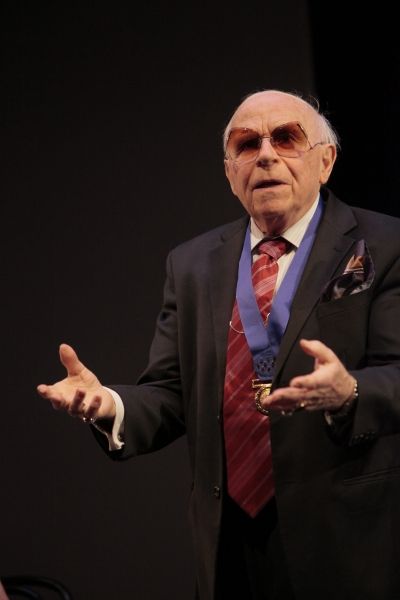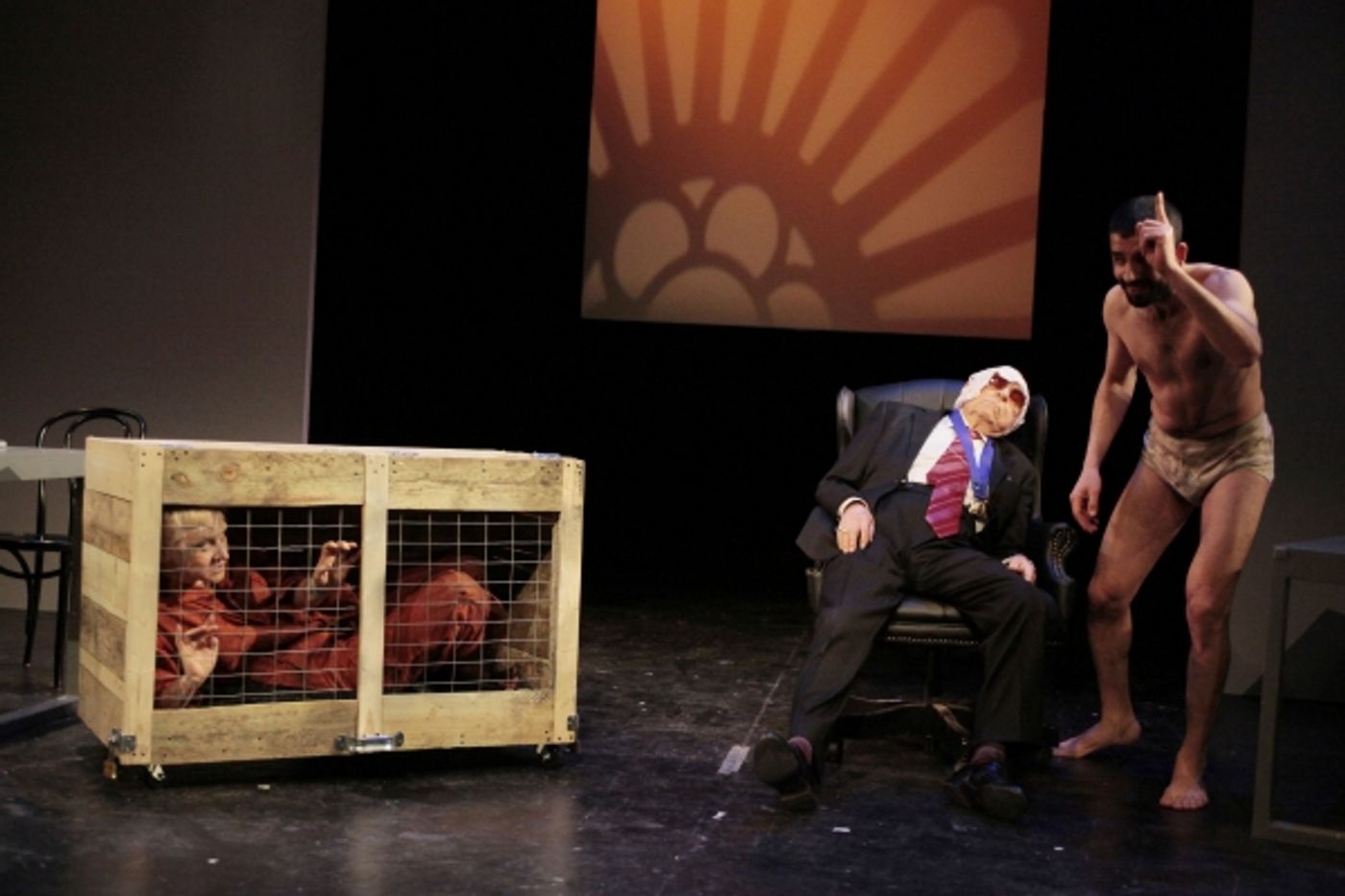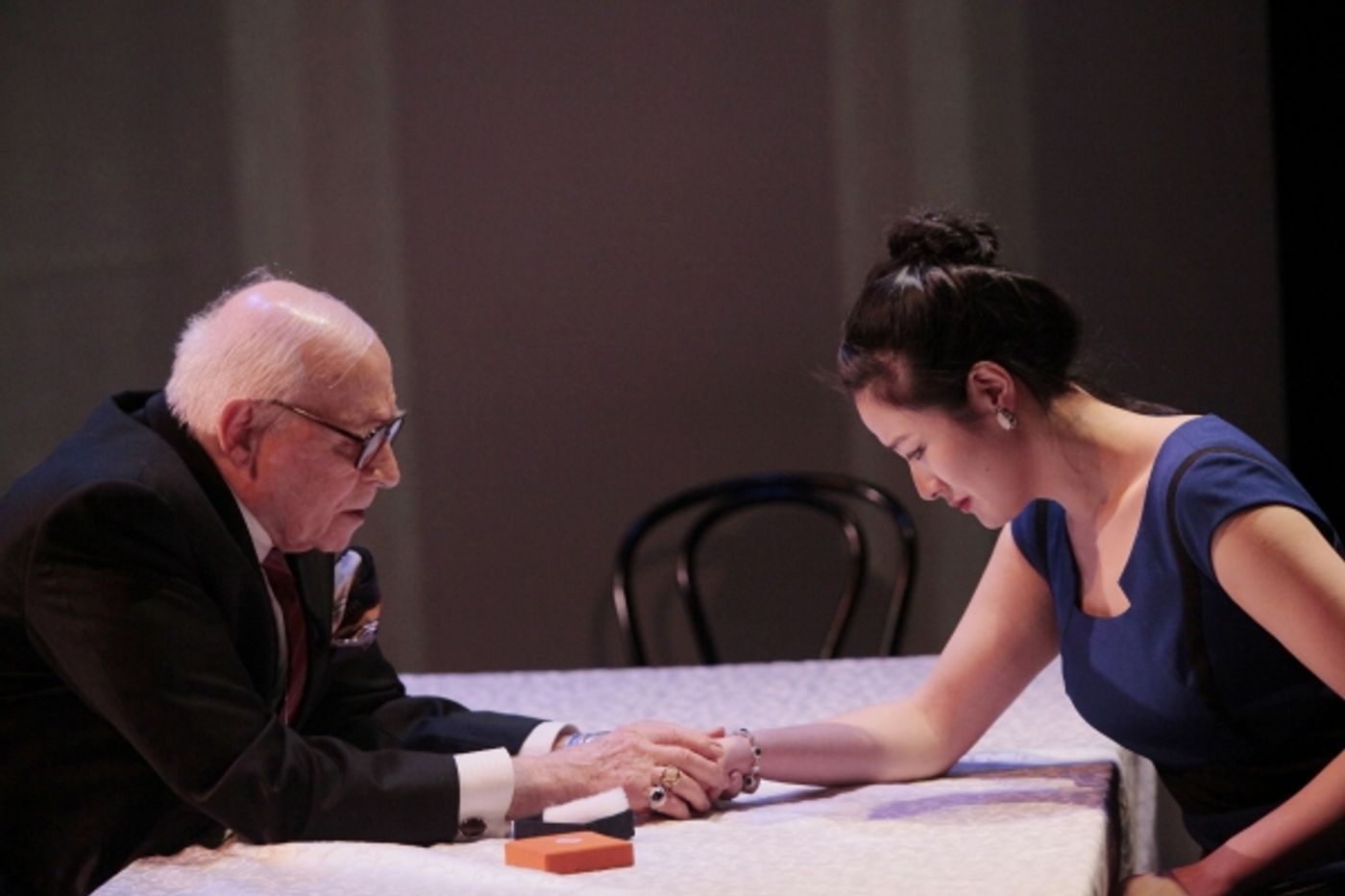Photo Flash: First Look at George Bartenieff and More in TNC's ANOTHER LIFE, Opening Tonight
George Bartenieff plays an out-sized captain of industry who privatizes and is ultimately undone by state-sponsored torture in "Another Life," written and directed by Karen Malpede, a surreal play that is based on real post-9/11 events. The play, written in a fast-paced lyric language, is based on research, interviews, testimonies, the words of torturers and tortured. It has been widely praised by experts in the field of human rights for its inventiveness, power and ability to create empathy. Theater for the New City will present the piece tonight, March 28 to April 21, accompanied by "A Festival of Conscience," a series of free post-play dialogues and panels with prominent lawyers, writers and activists, and readings of Malpede's play, "Extreme Whether," a story of heroic climate scientists facing censorship.
Below, BroadwayWorld has a first look at Bartenieff and more onstage!
"Another Life" begins during the 9/11 attacks in NYC and ends in 2009 during Congressional hearings on the release of the Red Cross Torture Report. The play swings back and forth between surreal and real. A mogul named Handel (played in Cheney-esque fashion by George Bartenieff) has founded a private contracting firm named Deepwater which, in our age of terrorism, has taken over the historically military functions of prisoner incarceration and interrogation. His wife, Tess (a former Chechen prostitute--Handel understands whores) an artist, has run outside to take photos.
His adopted daughter, Lucia, a physician, has been rescued by a Muslim taxi driver during the events of 9/11. Upon realizing her husband is one of the jumpers, she miscarries. Instead of being rewarded for her rescue, the cabbie is falsely accused of being a terrorist and is imprisoned in Handel's home, along with his increasingly rebellious wife, Tess, creating a sort of "Gitmo on Hudson." Having cornered the market for prison interrogations in the private sector, Handel and his firm soon become implicated in brutal interrogations at Bagram Air Force Base in Afghanistan, where his daughter had become the Doctor in Charge. Handel hires a former FBI interrogator, who had resigned over the torture program. He and Lucia find themselves implicated together in the torture. They both represent America gone wrong but with hope of redemption. As Handel becomes more and more megalomaniacal, Lucia ultimately morphs from accomplice to whistleblower, joining the International Red Cross and releasing the organization's Torture Report to the press.All this is conveyed in surreal, poetic language that, more than the violence it describes, delivers the themes of the piece. While the play contains three factual torture stories, it does not reenact violence, leaving it to the play's language to illuminate the transformation of Americans since September 10, 2001. Malpede explains that she has been struck, like many others, by both the degradation of public language on our shores and the shocking callousness of U.S. personnel involved in torture cases. A new language of torture, preserved in so many accounts, has emerged, providing a window into the soul of a nation suddenly overriding its own laws of wartime restraint. As the character of Handel profits in this play from wars, his language becomes increasingly graphic and grandiose.
The actors are George Bartenieff, Christin Clifford, Abraham Makany, Abbas Noori Abood, Alex Tavis and Di Zhu. Set design is by Robert Eggers, lighting design is by Tony Giovennetti, costume design is by Sally Ann Parsons and Carisa Kelly, video design is by Luba Lukova and music is by Arthur Rosen.
Karen Malpede is author/director of 18 plays including "Us," "Better People," and "Blue Heaven" (all presented by TNC), "The Beekeeper's Daughter" (Theater Row Theater) and "Prophecy" (NY Theatre Workshop). She is editor of "Acts of War: Iraq & Afghanistan in Seven Plays," "Women in Theater: Compassion & Hope" and "Three Works by the Open Theater." A McKnight National Playwrights' and NYFA fellow, she has taught dramatic literature, playwriting and writing at Smith College, New York University and the CUNY-Graduate Center's Continuing Education program. She is currently on the theater faculty at John Jay College of Criminal Justice.
George Bartenieff began his theater career at the age of 14 in "The Whole World Over," directed by Harold Clurman. He has acted on Broadway, Off and Off-off, in hundreds of new and classic plays. He was co-founder of Theater for the New City and co-founder of the Greenwich Village Halloween Parade. He and Karen Malpede adapted for the stage the diaries of Victor Klemperer, "I Will Bear Witness," as a one-person play that played to acclaim in New York, London, Berlin, Washington DC and toured Europe and the U.S. for three years. He is winner of four Village Voice Obie awards, including acting awards for his performances in Malpede's "Us" and "I Will Bear Witness."
The plays and festival have been developed by Theater Three Collaborative (www.theaterthreecollaborative.org). "Another Life" will be part of a Festival of New Works at RADA, London, this summer.
Photo Credit: Beatriz Schiller

George Bartenieff plays an out-sized captain of industry who privatizes and is ultimately undone by state-sponsored torture in "Another Life".

Tess (Christen Clifford), his rebellious artist-wife, has been incarcerated in the SoHo loft of Handel (George Bartenieff). Handel's slave, Egyptian cab driver Abdul (Abbas Noori Abbood), stands by.

Handel (George Bartenieff) meets his adopted daughter Lucia (Di Zhu) in a fancy restaurant, to present her with an emerald bracelet and convince her go back to work as a physician in his newly founded private contracting firm, Deepwater.

Videos

